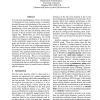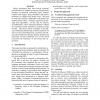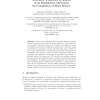105 search results - page 16 / 21 » Word Sense Disambiguation Using Lexical Cohesion in the Cont... |
ACL
2004
13 years 11 months ago
2004
In word sense disambiguation (WSD), the heuristic of choosing the most common sense is extremely powerful because the distribution of the senses of a word is often skewed. The pro...
LREC
2010
13 years 11 months ago
2010
Lexical substitution is the task of finding a replacement for a target word in a sentence so as to preserve, as closely as possible, the meaning of the original sentence. It has b...
TREC
2003
13 years 11 months ago
2003
Many researchers have used lexical networks and ontologies to mitigate synonymy and polysemy problems in Question Answering (QA), systems coupled with taggers, query classifiers,...
SIGIR
2005
ACM
14 years 3 months ago
2005
ACM
This paper presents an algorithm for unsupervised noun sense induction, based on clustering of Web search results. The algorithm does not utilize labeled training instances or any...
ERSHOV
2003
Springer
14 years 3 months ago
2003
Springer
Words in the explanatory dictionary have different meanings (senses) described using natural language definitions. If the definitions of two senses of the same word are too simi...



